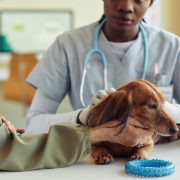Benefits and risks of neutering pets – what is the evidence – Obesity
Obesity
Published 26 November 2020 | Updated 21 July 2023
Concerns are often raised that neutering increases the risk of overweight and obesity and about the effect that this may have on health. However, in most cases any tendency towards increased bodyweight can be managed through appropriate nutrition.
- Benka, V.A. et al. (2023) Age at gonadectomy, sex, and breed size affect risk of canine overweight and obese outcomes: a retrospective cohort study using data from United States primary care veterinary clinics. Journal of the American Veterinary Medical Association. https://doi.org/10.2460/javma.22.12.0596
- Lefebvre, S.L. et al. (2013) Effect of age at gonadectomy on the probability of dogs becoming overweight. Journal of the American Veterinary Medical Association, 243 (2), pp. 236-243. https://doi.org/10.2460/javma.243.2.236
- Bjørnvad, C.R. et al. (2019) Neutering increases the risk of obesity in male dogs but not in bitches—a cross-sectional study of dog-and owner-related risk factors for obesity in Danish companion dogs. Preventive Veterinary Medicine, 170, 104730. https://doi.org/10.1016/j.prevetmed.2019.104730
- Bermingham, E.N., et al. (2014) Energy requirements of adult dogs: a meta-analysis. PloS ONE, 9 (10), p. e109681. https://doi.org/10.1371/journal.pone.0109681
- Schauf, S. (2016) Effect of sterilization and of dietary fat and carbohydrate content on food intake, activity level, and blood satiety–related hormones in female dogs. Journal of Animal Science, 94 (10), pp. 4239-4250. https://doi.org/10.2527/jas.2015-0109
- Kawauchi, I.M. et al. (2017) Effect of dietary protein intake on the body composition and metabolic parameters of neutered dogs. Journal of Nutritional Science, 6, e40 https://doi.org/10.1017/jns.2017.41
- Colliard, L. et al. (2009) Prevalence and risk factors of obesity in an urban population of healthy cats. Journal of Feline Medicine and Surgery, 11 (2), pp. 135-140 https://doi.org/10.1016%2Fj.jfms.2008.07.002
- Allaway, D. et al. (2017) The impact of time of neutering on weight gain and energy intake in female kittens. Journal of Nutritional Science, 6, e19 https://doi.org/10.1017/jns.2017.20
- Hoenig, M. and Ferguson, D.C. (2002) Effects of neutering on hormonal concentrations and energy requirements in male and female cats. American Journal of Veterinary Research, 63 (5), pp. 634-639. https://doi.org/10.2460/ajvr.2002.63.634
- Mitsuhashi, Y. (2011) Maintenance energy requirement determination of cats after spaying. British Journal of Nutrition, 106 (S1), pp. S135-S138 https://doi.org/10.1017/S0007114511001899
- Nguyen, P.G. (2004) Effects of dietary fat and energy on body weight and composition after gonadectomy in cats. American Journal of Veterinary Research, 65 (12), pp. 1708-1713. https://doi.org/10.2460/ajvr.2004.65.1708
- Spofford, N. et al. (2014) A moderate fat, low-energy dry expanded diet reduces gain in body condition score when fed as part of a post neutering weight-control regimen in growing pet cats. Journal of Nutritional Science, 3, e40 https://doi.org/10.1017/jns.2014.48







Leave a Reply
Want to join the discussion?Feel free to contribute!